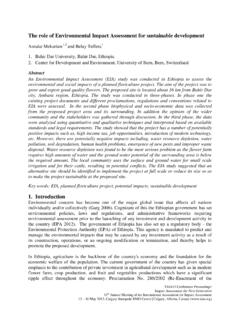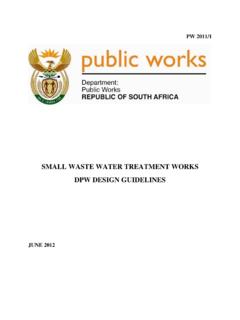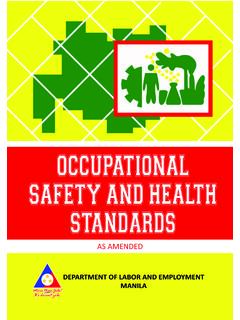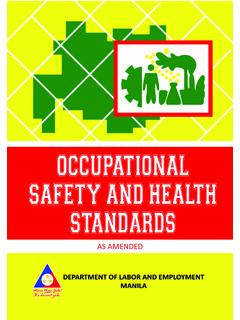Transcription of The Commerce Clause and the Environment
1 The Commerce Clause and the EnvironmentEarthjustice Exectutive Director Buck Parker discusses The Commerce Clause and its relation to environmental Law. On July 20, President Bush nominated John G. Roberts to succeed retiring Supreme Court Justice Sandra Day O'Connor. Judge Roberts has sat on the Circuit Court of Appeals for the District of Columbia since his appointment by President Bush in 2003. The Senate, which must confirm federal judges, has scheduled hearings on the Roberts nomination for early next month. Because federal courts are an essential mechanism in enforcing the laws that protect the Environment and public health, Earthjustice has taken an active role in scrutinizing the views and records of those appointed to lifetime service on the federal bench.
2 The Bush Administration and its right-wing supporters have made no secret of their intention to change how federal courts interpret laws and the Constitution by selecting new judges who are committed to a political ideology in which property rights, fundamentalist theology, commercial interests and reducing the role of the federal government are paramount goals. The intent is that new judges will decide cases in order to enshrine that philosophy as the law of the land. The implications of that ideology for how federal environmental laws are judicially interpreted and enforced are profound.
3 Here, I want to tell you a little about one of the important legal issues that the Roberts nomination raises: the Constitution's " Commerce Clause ." The Constitution grants only certain powers to the federal government; all other power is reserved to the states alone. Among the powers granted to Congress by Article I is the authority to "To regulate Commerce with foreign Nations, and among the several States, and with the Indian Tribes." That authority is the basis of most federal statutes enacted by Congress beginning in the 1970's to protect public health and the Environment , including the Clean Air Act, the Clean Water Act and the Endangered Species Act.
4 It is also the basis of many other important federal statutes as well, including civil rights laws. Congress stepped in to pass those laws only after decades of failure by individual states to deal with the underlying problems. In the environmental realm, individual states were simply unwilling to confront powerful national industries in order to protect the Environment for fear of losing jobs to other parts of the country. Until now, courts have generally upheld those federal laws as valid exercises of Congressional power under the Commerce Clause in Article I; as recently as June of this year, the Supreme Court rejected a challenge to federal laws prohibiting the private cultivation of marijuana for medical purposes as beyond the scope of the Commerce Clause in Gonzales v.
5 Raich. The Bush Administration hopes that is about to change, thanks to a new breed of federal judge. If federal courts can re-interpret the Commerce Clause to restrict the ability of Congress to regulate, then many long-standing environmental or public health statutes might be overturned as unconstitutional. Even worse is the prospect that if the Supreme Court were to endorse that view as a constitutional requirement, there would be no remedy other than to amend the Constitution. A variety of industry attacks on federal environmental laws aimed at achieving exactly that result are working their way through the federal court system and could reach the Supreme Court in the next few years.
6 John Roberts's judicial record is sparse and, where the Commerce Clause is concerned, troubling. His dissent in a 7-2 decision by the full appeals court not to reconsider a ruling in Rancho Viejo LLC v. Norton, which upheld a Fish and Wildlife Service decision to prevent a construction project that biologists said would jeopardize the endangered arroyo southwestern toad, suggests that it would be unconstitutional for the Endangered Species Act to protect an imperiled species that exists entirely within a single state. This view has thus far been uniformly rejected by the federal courts of appeals as contrary to established Supreme Court Commerce Clause precedent.
7 Is Judge Roberts' dissent a preview of his convictions as a Supreme Court justice? Earthjustice will urge the Senate to carefully examine Judge Roberts's record and to find out whether Roberts is committed to deciding cases fairly, based on precedent and the facts, or whether his dissent reflects an ideological agenda. Though the question sounds academic, it is not. While other concerns may dominate news coverage of the Senate confirmation hearings on Roberts next month, no question may be more important for the Environment than his views on the scope of the Commerce Clause .
8



